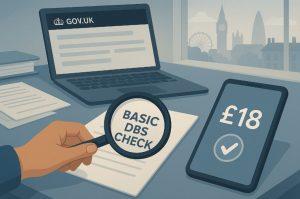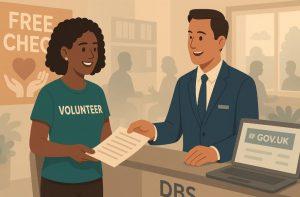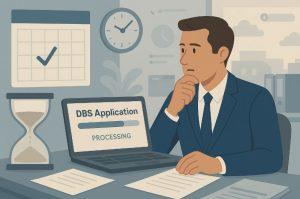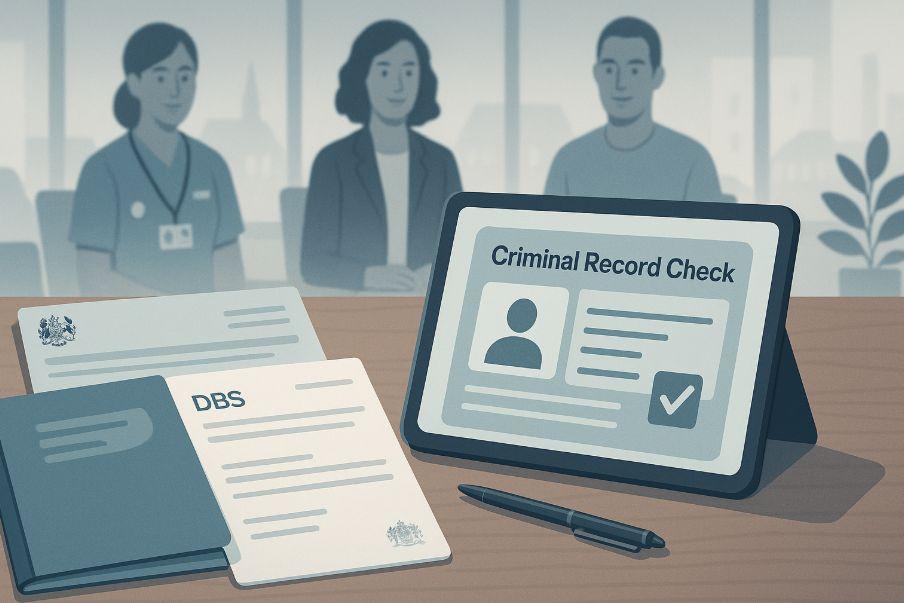The process of hiring in the UK is not just about finding the right skillset. it also involves safeguarding responsibilities, especially for positions involving children, vulnerable adults, or sensitive information. The Disclosure and Barring Service (DBS) plays a vital role in this by offering background checks to help employers make safer recruitment decisions.
Understanding the Disclosure and Barring Service cost is crucial, both for employers who must budget for staff vetting and for individuals who may be self-employed or volunteering. In this comprehensive guide, we break down every aspect of DBS fees in the UK, explore the types of checks, and address common concerns about who pays, how to apply, and what the costs actually cover.
What Is the Disclosure and Barring Service (DBS) in the UK?

The Disclosure and Barring Service, often referred to as DBS, is a public body under the UK Home Office. It was formed in 2012 following the merger of the Criminal Records Bureau (CRB) and the Independent Safeguarding Authority (ISA).
The DBS is responsible for processing requests for criminal background checks and maintaining barred lists registers of individuals who are legally prevented from working with children or vulnerable adults.
The organisation acts as a gatekeeper, offering vital insights into an individual’s criminal record to ensure safer employment decisions. Whether you’re hiring a teacher, nurse, driver, or volunteer, DBS checks allow employers to confirm that a candidate is legally eligible and morally appropriate for the role.
Why Are DBS Checks Important for Employers and Organisations?
The value of a DBS check goes beyond compliance. It reinforces public trust and creates a protective layer around people who are most at risk especially children and vulnerable adults.
DBS Checks Reinforce Safe Working Environments
When an organisation is hiring for positions of responsibility or care, due diligence becomes more than just a best practice it’s a legal and ethical requirement. By verifying a candidate’s criminal history, employers can identify red flags that may not surface during interviews or reference checks.
Meeting Industry Regulations and Legal Obligations
Certain sectors in the UK such as education, healthcare, and public transport are legally required to conduct DBS checks. Failing to do so could result in penalties or even loss of operational licenses. A robust DBS policy ensures your business stays compliant and audit-ready.
Building Public Trust in Your Brand or Organisation
Parents, carers, patients, and customers want assurance that the professionals they engage with are trustworthy. Having staff members who have been DBS checked signals that your organisation takes safeguarding seriously and prioritises transparency.
What Are the Different Types of DBS Checks?
DBS checks are categorised based on the depth of information required and the nature of the job role. There are three main levels of DBS checks: Basic, Standard, and Enhanced.
Basic DBS Check
The Basic DBS check is available to any individual or employer and discloses unspent convictions and conditional cautions. It’s ideal for entry-level roles or those not involving close contact with vulnerable individuals. For example, office staff or freelance professionals may need to present a Basic DBS to clients or contracts.
Standard DBS Check
The Standard DBS check reveals a deeper level of information, including both spent and unspent convictions, reprimands, cautions, and final warnings. This level of check is only available to employers and must be job-relevant. It is typically used in sectors like law, finance, and certain administrative roles that involve sensitive information or fiduciary responsibility.
Enhanced DBS Check
An Enhanced DBS check is the most thorough. In addition to the details covered in the Standard check, it may include relevant information held by local police forces. If the role involves regulated activity with children or vulnerable adults, the employer can also request a barred list check. This is essential for roles such as teachers, care workers, and healthcare professionals, where safeguarding risk is highest.
How Much Does a Basic DBS Check Cost?

Basic DBS Overview
A Basic DBS check is the simplest form of background screening offered by the Disclosure and Barring Service. It discloses any unspent convictions and conditional cautions on an individual’s record and is commonly used for roles that don’t involve regulated activities or vulnerable individuals.
Cost and Accessibility
The cost for a Basic DBS check is £18, making it the most affordable option. It is accessible to both individuals and employers. The application can be submitted through the official GOV.UK portal or via third-party providers. However, applicants using third-party services should be aware of additional processing or admin fees that may increase the overall cost.
Usage and Limitations
While the Basic DBS check is appropriate for many administrative, retail, or freelance roles, it is not suitable for positions that require supervision or care of children or vulnerable adults. For those, a more detailed check is required, such as a Standard or Enhanced DBS.
Disclosure and Barring Service Cost Breakdown
Understanding the full range of DBS check fees is essential for both individuals and employers. Each type of check has a fixed fee set by the UK government, although additional charges may apply depending on how and where the application is submitted. Below is a detailed breakdown of the current DBS check costs in the UK.
Type of DBS Check |
Applicant Type |
DBS Fee |
Eligibility Notes |
| Basic DBS | Individual or Employer | £18 | Can be requested by anyone; shows unspent convictions |
| Standard DBS | Employer Only | £18 | Available only for eligible roles; spent & unspent convictions shown |
| Enhanced DBS | Employer Only | £38 | Includes police intelligence; for roles involving vulnerable groups |
| Standard DBS (Volunteer) | Employer | Free | Must meet DBS criteria for volunteer roles |
| Enhanced DBS (Volunteer) | Employer | Free | Free for eligible volunteers in regulated activities |
| DBS Update Service (Individual) | Individual | £13/year | Optional annual subscription to keep DBS status current |
| DBS Update Service (Volunteer) | Individual | Free | Free for volunteers; same update benefits apply |
This table provides a quick reference for planning recruitment budgets, understanding applicant responsibilities, or making personal arrangements for freelance or voluntary roles.
What Is the Fee for a Standard DBS Check?
Standard DBS Overview
A Standard DBS check offers more detailed information than a Basic check. It includes both spent and unspent convictions, as well as cautions, warnings, and reprimands recorded on the Police National Computer. It provides employers with a clearer picture of an individual’s criminal history.
Fee and Application Process
The fee for a Standard DBS check is £18, just like the Basic check. However, only registered employers or umbrella bodies can submit applications for a Standard DBS. Individuals cannot apply for this level of check on their own.
Common Role Requirements
Standard checks are often required for professions that involve positions of trust, but not necessarily direct work with vulnerable people. Examples include roles in finance, legal services, security clearance roles in government, and IT positions with access to sensitive data.
How Much Do You Pay for an Enhanced DBS Check?
Enhanced DBS Overview
An Enhanced DBS check is the most thorough background screening available. It includes everything in a Standard check, with the addition of relevant information from local police records. If the role involves working with vulnerable groups, the check may also include a barred list check, confirming whether the individual is prohibited from engaging in certain types of regulated activity.
Fee Structure and Coverage
The cost of an Enhanced DBS check is £38, reflecting the depth and complexity of the information gathered. This includes national criminal record checks, local police intelligence, and checks against the children’s and/or adults’ barred lists (if applicable).
Industries Requiring Enhanced Checks
Enhanced DBS checks are typically required in roles that involve direct, unsupervised access to vulnerable individuals. This includes jobs in:
- Education
- Healthcare
- Childcare
- Social services
- Charitable organisations providing care
Responsibility for Payment
In most regulated sectors, employers are expected to cover the cost of Enhanced DBS checks for new hires. Some organisations may also offer free updates via the DBS Update Service, ensuring that certificates remain current without requiring repeated full checks.
Are There Different Costs for Volunteers?

In a bid to encourage voluntary work and community service, the UK government offers free DBS checks for eligible volunteers. This applies to both Standard and Enhanced DBS checks, helping charitable organisations ensure safeguarding without financial strain. However, it’s important to understand that eligibility for a free DBS check is based on specific criteria set out by the Disclosure and Barring Service.
Eligibility Criteria for Volunteer DBS Checks
To qualify for a free DBS check, the individual must be performing their duties without payment, apart from reasonable expenses such as travel or meals. More importantly, the benefit of the work must go to others, not the volunteer themselves.
For example, someone volunteering in a school, hospital, or charity care home would likely qualify. Conversely, someone volunteering in a role primarily for their own benefit, such as part of a university course, may not.
Third-Party and Umbrella Body Charges
Although the government waives the DBS check fee for volunteers, this doesn’t always mean the entire process is free. Many umbrella bodies or third-party DBS services charge administrative or processing fees. These can range from £5 to £20, depending on the provider and services included, such as identity verification or digital certificate tracking.
Importance of Reviewing Application Costs
Before submitting a DBS application through a third party, it is essential to review what the quoted fee covers. Some providers may bundle necessary services into one fee, while others might separate costs for each step. Always ensure you understand whether you’re paying for added convenience or services beyond the DBS check itself.
Who Is Responsible for Paying the DBS Check Fee?
Responsibility for DBS payment often depends on the nature of employment and internal HR policies.
Employer-Funded Checks
In many industries particularly where DBS checks are legally mandated the employer covers the cost. This includes sectors like education, healthcare, and social work. It’s considered part of the onboarding or recruitment process.
Applicant-Funded Checks
For self-employed professionals, freelancers, or contractors, paying for a DBS check may be a personal responsibility. In such cases, individuals are often expected to provide their own Basic DBS certificate as part of contract compliance.
When Third-Party Costs Come Into Play
Even if the DBS fee is covered, third-party services or umbrella bodies often apply handling or processing fees. Always confirm in advance whether your application involves such charges.
What Is the Cost of the DBS Update Service?
To reduce the need for repeat checks, the DBS offers an Update Service a subscription-based tool that allows employers to check an applicant’s DBS certificate status online, rather than requesting a new one each time.
Subscription Pricing and Benefits
For individuals, the DBS Update Service costs £13 per year. Volunteers, however, can subscribe for free. The service helps those who work across multiple roles or change jobs frequently to keep their DBS status current without reapplying.
Why It’s Worth Considering
If you move between employers or sectors often, the Update Service can save both time and money. Many large organisations prefer candidates who are already subscribed, as it speeds up hiring timelines.
How Long Does a DBS Check Usually Take?

The turnaround time for DBS checks depends on several factors such as the type of check, the accuracy of the application, and regional police response times.
Expected Timeframes
Basic DBS checks are typically the quickest, taking between 1 to 5 working days. Standard checks may take up to 10 working days, while Enhanced checks could require 7 to 14 days or more, particularly if multiple police forces are involved.
Errors in the application form or delays in identity verification can cause additional delays. It’s always best to submit clear, accurate documentation to minimise processing time.
Are There Any Hidden or Additional Charges in the DBS Process?
Officially, the costs for DBS checks are fixed. However, hidden fees can arise through private application portals or umbrella bodies.
Extra Charges May Occur
Many third-party services charge administrative fees for submitting applications on behalf of employers or individuals. These charges often include VAT and can range between £5 and £25. There may also be ID verification fees or charges for postage and tracking of physical certificates.
Applicants should always confirm the total cost before proceeding.
How Do You Apply and Pay for a DBS Check?
The application method differs depending on the type of DBS check required.
Applying for a Basic DBS Check
Individuals can apply directly through the official GOV.UK portal. The process is simple and involves creating an online account, verifying ID, and paying the £18 fee via card.
Applying for a Standard or Enhanced Check
Only registered organisations or umbrella bodies can request Standard or Enhanced checks. Employers usually guide applicants through the application process and manage the associated payments internally.
Conclusion
The Disclosure and Barring Service cost in the UK varies by check type and applicant status, but it is an essential investment in safety and compliance. Whether you’re an employer in London seeking to vet your staff, or a freelancer needing clearance for a public sector contract, understanding these fees and how to manage them will make the process smoother and more efficient.
DBS checks are not just about legal obligation they demonstrate integrity, accountability, and commitment to safeguarding vulnerable communities. With transparent pricing and a streamlined application process, there’s no reason not to make DBS checks a cornerstone of your recruitment strategy.
FAQs About DBS Check Costs in the UK
Can volunteers get a DBS check for free?
Yes, Standard and Enhanced DBS checks are free for eligible volunteer roles.
How much does a Basic DBS check cost?
A Basic DBS check costs £18.
Who pays for a DBS check the employer or the applicant?
Typically, employers pay, but individuals may cover the cost for freelance or voluntary roles.
What is the cost of the DBS Update Service?
The DBS Update Service costs £13 per year and is free for volunteers.
How long does a DBS check take to process?
Basic checks take 1–5 days; Standard and Enhanced can take up to 14 days.
Are there hidden charges in DBS applications?
Third-party services may charge admin fees in addition to the official DBS fee.
Can I apply for a Standard or Enhanced DBS myself?
No, only employers or registered bodies can apply for these on your behalf.









Leave feedback about this